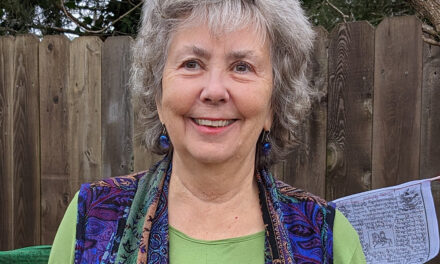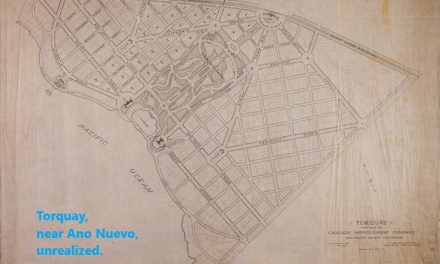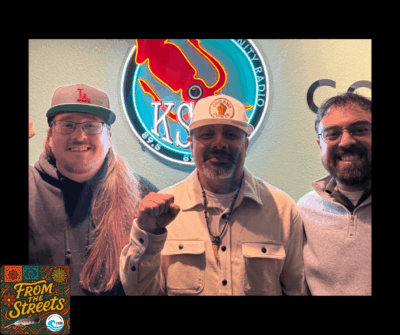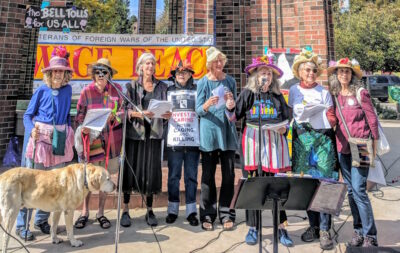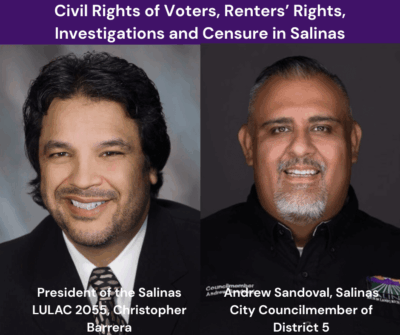
In this segment of Talk of the Bay, I talk with Flora Lu, Provost of College Ten (Now Lewis College) and Sarah Woodside Bury about the renaming of the college and Lewis’ legacy.

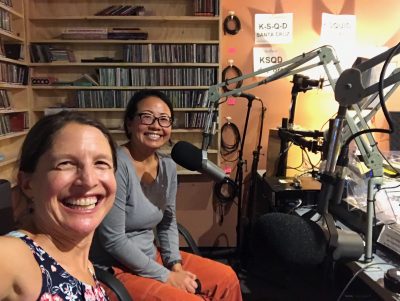
From UCSC’s press release:
UC Santa Cruz advances commitment to social justice with College 10 naming in honor of John R. Lewis
The University of California at Santa Cruz announced today that College Ten—an undergraduate residential learning community founded on principles of social justice and community—will be named in honor of the late congressman and civil rights icon John R. Lewis.
Lewis was a renowned student leader in the civil rights movement who stood against racism with bravery, conviction, and organized action during many pivotal moments that helped pave the way for the Civil Rights Act of 1964 and the Voting Rights Act of 1965. Later, Lewis served for 17 terms in the House of Representatives, during which time he became known as “the conscience of Congress” for his continued commitment to justice and equity.
UC Santa Cruz Chancellor Cynthia Larive announced the naming in Washington, D.C., alongside Michael Collins. Collins was Lewis’s chief of staff for 21 years and is a representative of the John R. Lewis Trust, which granted permission for the naming. The announcement included live interaction with students, staff, and faculty gathered at College Ten. The official dedication of John R. Lewis College at UC Santa Cruz will take place in spring of 2022, after a series of events that will expand upon a campus-wide commitment to social justice.
“This is a profound honor and a great responsibility for UC Santa Cruz,” Larive said, regarding the naming news. “Our campus community must strive daily to live up to the legacy of Congressman John R. Lewis and to answer his call to create a more just and fair society. This urgent work of advancing social justice is fundamental to our work as a university and is continued by our alumni throughout their careers.”
Undergraduate students at UC Santa Cruz affiliate with one of 10 residential colleges, each of which focus on different themes, including environmental stewardship, creativity, cultural identity, or in the case of College Ten, social justice and community. College Ten will be the first residential college at UC Santa Cruz to be named in honor of a person of color.
“We have a wonderful opportunity to deepen the alignment between our community’s aspirational and lived values,” said Interim Vice Chancellor for Student Affairs and Success Jennifer Baszile. “The endowment that will be created with this naming will allow us to advance the experiential opportunities for students to enact social change-making. Congressman Lewis offers us all an inspiring example of student empowerment and institutional transformation that is certainly worthy of celebration.”
Bearing Lewis’s name will be a momentous calling for the faculty, staff, and students of College Ten to work in community in the pursuit of social justice, a principle to which Lewis dedicated his life.
“This opportunity to name the college for someone as inspirational as John Lewis is deeply humbling, and it comes with a major responsibility,” said Flora Lu, who is provost of College Ten and College Nine and a professor of environmental studies. “This will be about doing the hard work, individually and together, to aspire to meet the call of what John Lewis entreated us all to do.”
College Ten is the youngest and one of the most diverse of UC Santa Cruz’s residential colleges, and since its founding in 2002, it has been focused on offering programming and courses to help students become change agents for justice and equity. While UCSC undergraduates from any field of study can join College Ten, the college has a formal connection with the Social Sciences Division, which helps to support its work.
“The naming of John R. Lewis College really advances our driving motivations as a division,” said Social Sciences Dean Katharyne Mitchell. “John Lewis was passionate about social justice, racial justice, civic engagement, and democracy, and we are too. We strive every day to walk that walk, and this naming will be a very important moment to lift our aspirations even higher.”
To ensure the college is positioned to create new programs and scale existing ones that advance those values, a donor-funded endowment will support the college in perpetuity.
The future John R. Lewis College will seek new avenues for social justice impact while building upon College Ten’s strong foundations. The college’s curriculum and programs were designed from the outset to provide learning opportunities, both inside and outside of the classroom, that empower students with crucial skills, knowledge, and perspective to build a more just and equitable world.
“Our goal is to teach our students what it means to be a social change agent,” said Sarah Woodside Bury, senior director for college student life at College Ten and College Nine. “That comes with an understanding of the history and legacy of the hard work of those who have come before us, and it also means students understand that they have their own voice and agency to be the future of that change.”
Honoring a legacy of leadership
John Lewis’s own path to becoming a change agent began when he was a student at seminary school and Fisk University in Nashville, Tennessee. He learned nonviolent civil disobedience from Rev. James M. Lawson, Jr. and helped to organize the lunch counter sit-ins of 1960 with the Nashville Student Movement. The success of those early nonviolent direct action campaigns convinced Lewis of the need to get into what he called “good trouble, necessary trouble,” in order to drive change. He lived the rest of his life by that motto.
Lewis was arrested 40 times during the 1960s as he continuously put his life on the line to push for civil rights. In 1961, Lewis was one of the original 13 freedom riders who faced constant violence as they rode buses together in inter-racial groups to enforce the desegregation of interstate travel across the South.
His success in demanding change came not only from his personal courage, but also from his dedication to organizing. Drawing inspiration from Ella J. Baker and others, Lewis was one of the founders of the Student Nonviolent Coordinating Committee (SNCC) and was elected chair of the organization in 1963. In that role, he became one of the “big six” civil rights leaders who organized the 1963 March on Washington for Jobs and Freedom, where Rev. Martin Luther King, Jr. delivered his famed “I Have a Dream” speech.
Lewis was 23 years old at the time, and he spoke before a crowd of more than 250,000 to deliver a message of his own about the urgent need for action on civil rights. His words resonated with young people across the country.
“We must say, ‘Wake up, America! Wake up!’” Lewis called. “For we cannot stop, and we will not and cannot be patient.”
UC Santa Cruz Professor Emeritus of Sociology John Brown Childs was among the members of the crowd that day, and he said Lewis’s words left a lasting impression on him.
“For those of us who were young people at the time, he spoke directly to us, and it had a deep impact,” Childs said. “John Lewis was inspiring to me because he deeply believed in the reality of nonviolence and that, whatever we had to struggle for, the struggle must go on. And he didn’t work in isolation; he reached out to the world.”
As the leader of SNCC, Lewis played an instrumental role in organizing the Freedom Summer of 1964, which sought to register Black voters across Mississippi. UC Santa Cruz Professor Emeritus of Sociology Hardy T. Frye, who passed away in June, was volunteering for SNCC in Mississippi at the time. At one point, he was arrested and spent several hours in jail alongside John Lewis. Frye later recalled that the experience “felt like being in jail with the Lord.”
Lewis and Hosea Williams also famously led the first march for voting rights from Selma to Montgomery, Alabama, across the Edmund Pettus Bridge. State troopers were waiting at the other end of the bridge and began beating the peaceful demonstrators. The violence of that day shocked the nation.
Afterward, Lewis, who suffered a fractured skull, called on President Johnson to take action. The marches continued, and the movement grew. It became a major turning point that rallied public support for the 1965 Voting Rights Act. Lewis’s work ultimately made essential contributions to the passage of both the 1964 Civil Rights Act and 1965 Voting Rights Act.
In the years that followed, he took his struggles for justice inside the halls of government. Lewis served 17 terms in the U.S. House of Representatives for Georgia’s 5th District, where he remained a constant guardian and advocate for civil rights and voting rights. The proposed John Lewis Voting Rights Advancement Act of 2021—which seeks to protect and strengthen elements of the 1965 Voting Rights Act—was named in recognition of Lewis’s impact.
As a legislator, Lewis never lost sight of the value of direct action. He set an example for other elected officials by standing up for what he believed was right. He was arrested in Washington on several occasions, including for protesting against apartheid in South African and genocide in Darfur and advocating for immigration reform. He also led a sit-in in the House of Representatives in an effort to force action on gun-control legislation in the aftermath of the 2016 Orlando nightclub shooting.
President Barack Obama, who awarded Lewis the Presidential Medal of Freedom in 2011 for a lifetime of service, characterized his impact by saying:
“Generations from now, when parents teach their children what is meant by courage, the story of John Lewis will come to mind—an American who knew that change could not wait for some other person or some other time; whose life is a lesson in the fierce urgency of now.”
Lewis passed away on July 17, 2020, but before his death, he reached out across generations to lend his support to new waves of activism around the Black Lives Matter movement, climate change and environmental justice, and other struggles for the future. Lewis always hoped and believed that today’s young leaders would carry the fight for liberty forward, in their own way. In his 2017 book, Across That Bridge: A Vision for Change and the Future of America, Lewis left behind a message that will resonate long into the future.
“Freedom is the continuous action we all must take,” he wrote. “And each generation must do its part to create an even more fair, more just society.”
Michael Collins, Lewis’s former chief of staff and a representative of his trust, hopes the students, faculty, and staff of the future John R. Lewis College will play a part in making that vision a reality.
“On behalf of the John R. Lewis family, we are deeply grateful for this distinguished honor and tribute to the legacy of Congressman Lewis,” he said. “It is our hope that through the naming of the John R. Lewis College, we will inspire a future generation of ‘good trouble’-makers that our country and world deserve. Through such steps, we continue to build upon ‘the beloved community’ the Congressman fought so hard to advance.”
—–SIDEBAR—–
College Ten cultivates change-makers
College Ten hosts a wide variety of programs that support students in advancing social justice and building community. To learn more about the initiatives highlighted below—and many others—please visit the college’s website.
- Practical Activism Conference: This student-organized annual event highlights pathways for change, from voting and civic engagement to nonviolent protest. In 2021, the keynote speaker was renowned educator and social justice activist Dr. Angela Davis, a UCSC distinguished professor emerita. Workshops addressed themes including global youth activism, Black Lives Matter, and the effects of COVID-19 on BIPOC communities.
- Transcommunal Peace Making: In partnership with Barrios Unidos and the Cemanahuac Cultural Group at Soledad Correctional Training Facility, this course brings together undergraduates and incarcerated men to learn with and from each other about peacemaking, solidarity, and unity through difference.
- Campus/Community Partnerships: The Apprenticeship in Community-Engaged Research, or (H)ACER, teaches students how to address injustices through research methods that facilitate the co-creation of knowledge. College Ten also features a volunteer club called PRAXIS and an Alternative Spring Break program in partnership with organizations in Watsonville and the Osher Lifelong Learning Institute at UCSC.
- Building Student Leadership and Skills: The College Ten Social Justice & Community Leadership Certificate is awarded at commencement to students who engaged in consistent and sustained leadership linked to the college’s theme. Upper-division College Ten students can also apply to teach the college’s Social Justice Issues Workshop, where students deepen their understanding of social justice, learn how to foster constructive dialogue, and undertake an action project.


